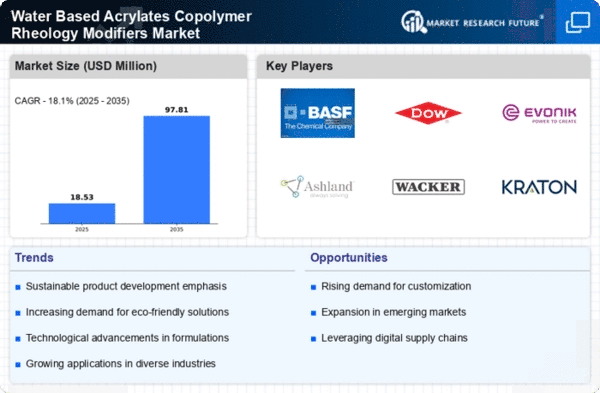Market Analysis
In-depth Analysis of Water Based Acrylates Copolymer Rheology Modifiers Market Industry Landscape
Understanding why rheology modifiers are becoming more popular in the cosmetics and personal care industry is simpler than it sounds. Let's break it down: Major Impact of Cosmetics & Personal Care Industry: Second Largest Application: After paints and coatings, the cosmetics and personal care industry is the second-biggest player for rheology modifiers. Key Ingredients: Rheology modifiers play a crucial role in cosmetics and personal care products, making them a vital part of this industry. Cosmetics & Personal Care Industry Growth: Global Expansion: This industry is on the rise globally, with an estimated growth rate of 3.5% to 4.5% until 2020. Driving Factors: Increased awareness about cleanliness and rising incomes, especially in developing countries, are pushing the growth of the personal care industry worldwide. Big Market: By 2020, the overall cosmetics and personal care market is expected to be valued at a whopping USD 638.5 billion. Key Applications – Skin Care and Hair Care: Prominent Usage: Within personal care and cosmetics, skin care and hair care take the lead, accounting for a significant share. Water-Based Trend: Water-based rheology modifiers are widely used in these applications, with hair care projected to experience the highest growth. Various trends in these applications are expected to drive the use of rheology modifiers in the industry. Shift to Waterborne Rheology Modifiers: Environmental Concerns: The shift from solvent-borne to waterborne rheology modifiers is gaining momentum due to environmental concerns. Regulatory Landscape: Governments worldwide are enforcing stricter regulations to reduce environmental impact, especially in paints, coatings, and personal care products. Reducing Solvent Emissions: Regulations like the Integrated Pollution Prevention and Control Directive (IPPC) focus on minimizing Volatile Organic Compounds (VOC) emissions. Water-based rheology modifiers, being VOC-free, are considered more environmentally friendly. Preference for Waterborne Technology: End-use manufacturers are inclined towards waterborne technology to meet environmental standards. This shift is particularly evident in architectural coatings, and other markets like automotive and industrial coatings are also moving away from solvent-borne towards waterborne rheology modifiers. In essence, the cosmetics and personal care industry's growth is a significant factor driving the popularity of rheology modifiers, with a notable shift towards more environmentally friendly waterborne technology.


















Leave a Comment